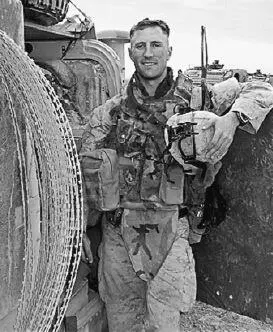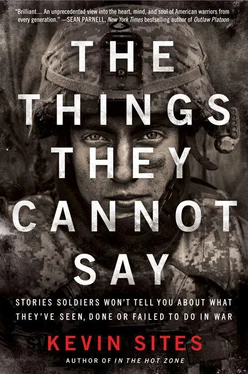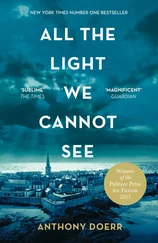The trauma of the event invaded Ayala’s sleep, giving him picture-for-picture nightmares of what happened, sometimes as often as several times a week. Eventually, the images followed him from the end of his deployment in Iraq all the way back home. In an effort to outrun them, he married his girlfriend, his best friend’s little sister, who was just eighteen years old. Ayala was twenty. It was not an easy time for the young couple, as Ayala’s very identity had become entwined with the terrible things he had seen and been part of. The memories of the blue-on-blue incident were like vines wrapped around a tree, both squeezing the life out of him and holding him in place, tethering him to that November day in 2005. He avoided crowds, nearly jumped out of his skin during a Fourth of July fireworks display and kept a loaded shotgun leaning against the bed, paranoid someone would break into the house. At night, believing he was still in Iraq, he would sometimes roughly shake his wife awake and tell her it was her turn for guard duty. Other times she would wake him, telling him he was shouting out random phrases in Arabic. His life became a mixed bag of corrective medications. He began taking lorazepam for depression, Celexa for anxiety, Ambien to sleep. The Ambien led to sleepwalking and episodes where Ayala would turn on all the lights in the house and toss the towels and bedding on the floor, almost as if he were searching for weapons in Iraqi homes during his deployment.
Even with all the medications, he would still sometimes wake up covered in sweat and hyperventilating. Despite all the challenges of his return, Ayala’s wife became pregnant and gave birth to a baby girl they named Kyleigh. But the happiness of having a new daughter couldn’t assuage the pressures presented by the couple’s youth and Ayala’s post-traumatic stress. The marriage ended after just two years. Ayala knew he needed help and the medications weren’t working. He wanted to talk to someone about his issues related to his deployment, but still being in the military, he knew that could be a tricky path that could hamstring or end your career by getting you labeled mentally unfit for service. Ayala was willing to take the risk, especially since his burden was compounded by a personal tragedy. His adopted mother, Pam, was diagnosed with cervical cancer. Her condition deteriorated quickly and she died on May 13, 2008, while Ayala was on a plane from Fort Benning in Georgia to New Hampshire, on his way to see her. Now the person he probably trusted most would no longer be there for him.
“A lot of guys don’t want to be seen as weak,” he says. “But my feeling is, if you need help, you need help.”
Ayala found it through an Army Family Life chaplain at Fort Benning who had just been training in EMDR (eye movement desensitization and reprocessing) therapy. The technique induces rapid eye movement in the patient, who follows the therapist’s finger or a light bar with their eyes, theoretically opening up a channel of the brain to help the patient to neutralize the negative thoughts or memories that plague them.
“He just kept asking me a series of questions that took me from that place in my mind where I was a screwup to ‘I’m a good guy, just bad things happened to me,’” says Ayala. After a series of these sessions he began to improve and eventually stopped taking the antidepressants and sleep aids that had been prescribed for him. He says he still has the occasional nightmare about the friendly-fire incident, especially as the anniversary of the date it happened draws near. But he’s in a better place.
While time and therapy gave him some healing and perspective on the harrowing events of his first combat deployment, in the spring of 2010 he was sent to war again, this time to Afghanistan. No longer the innocent child watching Gulf War soldiers on television, he felt as if he’d seen enough war in this lifetime and was not eager to go. Before he left, he wondered how the new memories and trauma of this war would stack against the old. Would there be room for it or would the burden of another year of killing and watching others die once again become too much? He also questioned whether he would actually survive himself. At the very least he felt satisfied that he had done his best to reassemble the jumbled pieces of himself that he was left with after Iraq and was prepared to do the same if he had to once again, after Afghanistan.
“I know what I’m getting into. I’ve experienced war,” he says. “Going to Afghanistan, I’m hoping to get some closure from it, where this time nothing happens—we leave with all the guys and come back with all the guys.”
Postscript
Ayala sent me an e-mail after he got back from Afghanistan in the spring of 2011.
I got back from Afghanistan about three weeks ago. Definitely not quite what I was expecting. They will stand and fight you much longer and harder than the Iraqis, but they also, for the most part shoot at you from a longer distance. I got promoted to SGT re-enlisted for another five years and I reunited with my ex-wife shortly before I deployed to Afghanistan. It was a struggle over there, I lost some good friends, but all in all, I’m doing ok, despite everything.
An e-mail from Ayala a few months later tells me he’s separated from his wife again, but… still doing okay.
Chapter 8: Making It Right
When you go to war and you come back it doesn’t leave you. How can you not think about things differently?

Captain Zachary Iscol, U.S.M.C.
3rd Battalion, 1st Marines
The War in Iraq (2003–05)
In America we are inclined to want to dismiss the achievements of someone we consider to be from a privileged background. We consider what they have accomplished somehow not fully earned, the gifts of wealth and connections likely, we believe, creating the gilded path. But while Zachary Iscol did indeed grow up as the scion of privilege—his father was a successful businessman and wireless communications entrepreneur—the focus of his upbringing revolved around the concept of public service rather than entitlement. His mother had been a public school teacher at one time but had moved into a larger arena working on education issues with the likes of Democratic Party political giants like Hillary Clinton and Al Gore.
Because their house bordered a four-thousand-acre land preserve in Pound Ridge, New York, Iscol grew up exploring and playing in the woods. He dreamed of becoming not a businessman but a marine biologist. But what Iscol did learn from both parents was that privilege was repaid in responsibility, that it was necessary to give back to the community. It was a philosophy reinforced at Iscol’s high school, Phillips Exeter Academy in Exeter, New Hampshire, one of America’s oldest and most celebrated boarding schools. Exeter’s founder, John Phillips, made it clear in the act of incorporation that established the school in 1781 that instilling knowledge alone was not enough; “goodness” also had to be the mission of the institution.
Above all, it is expected that the attention of instructors to the disposition of the minds and morals of the youth under their charge will exceed every other care; well considering that though goodness without knowledge is weak and feeble, yet knowledge without goodness is dangerous, and that both united form the noblest character, and lay the surest foundation of usefulness to mankind.
Iscol took the lesson to heart; he loved being part of a team, working together to achieve something. And although he was on the small side he participated in aggressive team sports like soccer and ice hockey. Later, when he graduated from Exeter and attended Cornell University, he even played in a so-called lightweight or sprint college football league. It was here, through the team’s coach Terry Cullen—who had received both a Purple Heart and the nation’s third-highest decoration, a Silver Star, as a Marine officer in Vietnam—that Iscol began to think of the military as his way of giving back, as both his parents and his high school had encouraged him to do.
Читать дальше













